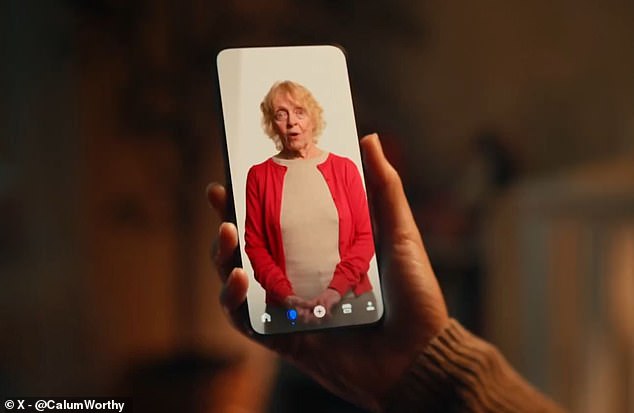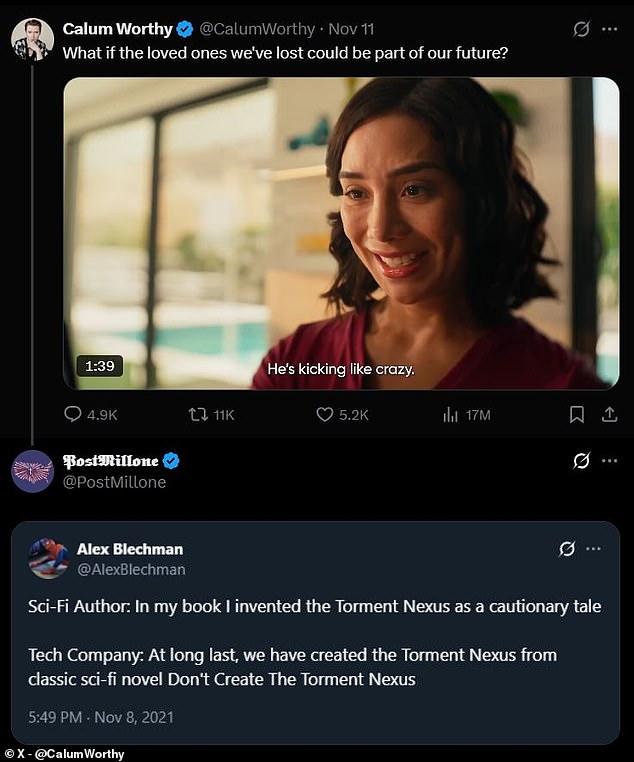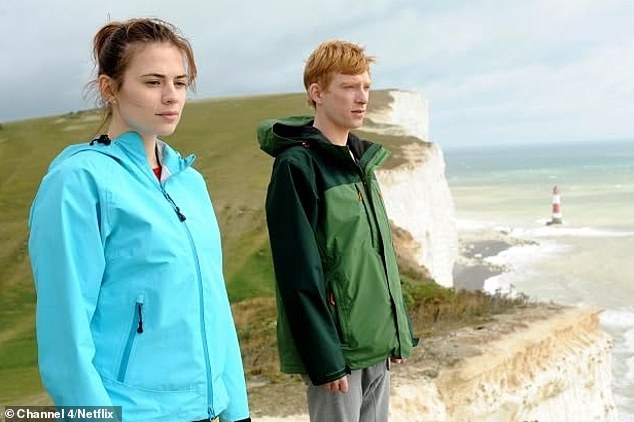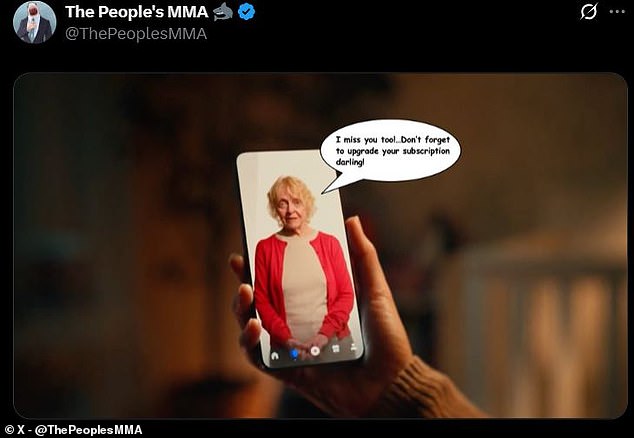Former Disney star Calum Worthy has been blasted for his app that uses artificial intelligence (AI) to create avatars of dead loved ones.
In a post on X, Mr Worthy, 34, shared a disturbing advert for the app, writing: ‘What if the loved ones we’ve lost could be part of our future?’
Mr Worthy, who starred as Dez Wade on the Disney Channel series Austin & Ally, added that his company, co–founded with Hollywood producer Russell Geyser, is ‘building a living archive of humanity’.
The controversial advert shows a pregnant woman speaking to an AI recreation of her deceased mother through the app, which is titled 2wai.
The video then jumps forward in time, showing the ‘grandmother’ reading a bedtime story to the newborn baby boy, talking to them as they return from school, and discussing the birth of their own child.
Finally, the video shows the woman making a short recording of her mother to create the digital avatar, as a slogan states: ‘With 2wai, three minutes can last forever’.
Social media users have been outraged by the concept, branding it ‘objectively one of the most evil ideas imaginable’.
Many have found the consequences of this technology fundamentally appalling, with one commenter describing the app as ‘demonic, dishonest, and dehumanizing.’

Former Disney star Calum Worthy has been slammed for his app, named 2wai, which allows users to recreate digital avatars of their dead loved ones (pictured)

On social media, tech fans have reacted with horror to an advert for the company that shows a woman talking to an AI avatar of her dead mother (pictured). With some users joking that Mr Worthy clearly missed the point of cautionary science–fiction stories

On X, one commenter bluntly described the 2WAI app as ‘one of the most evil ideas imaginable’
The 2wai – pronounced ‘two way’ – is now available for iOS devices on the App Store and allows users to create virtual avatars, which the company calls a ‘HoloAvatar’.
These are essentially animated interfaces for chatbots, designed to look like real or fictional individuals.
The company has created several default HoloAvatars, including a personal trainer named Darius, an astrologist called Celeste, and a chef named Luca.
2wai has also appropriated the likenesses of historical figures such as Shakespeare and, bizarrely, King Henry VIII.
However, the most shocking aspect of the tech is the ability to create HoloAvatars out of real individuals by recording a three–minute video of them.
The company hasn’t shared any information about how this tiny amount of data would allow the AI to recreate someone’s personality, and 2wai did not respond to a request for further information.
However, the promise that the app will allow users to indefinitely resurrect their loved ones as chatbots has set ethical alarm bells ringing.
Taking to X, one commenter wrote: ‘Nothing says compassion like turning someone’s grief into a business opportunity.’

One social media user slammed the app, calling it ‘demonic, dishonest, and dehumanizing, ‘ adding that they would ‘curse’ anyone who tried to resurrect them as an AI avatar

Some tech fans pointed out the obvious similarities to an episode of the dark science fiction series Black Mirror

The concept bears a striking resemblance to the Black Mirror episode ‘Be Right Back’ (pictured), in which a grieving woman recreates a digital copy of her deceased partner
Another joked: ‘Hey so what if we just don’t do subscription–model necromancy?’
While another bluntly added: ‘You need to be put in prison.’
Naturally, tech fans quickly saw the obvious similarities to the Black Mirror episode ‘Be Right Back’, in which a grieving woman recreates a digital copy of her deceased partner.
While the episode was intended as a dark cautionary tale about the dangers of using technology to hold on to the past, Mr Worthy and the team at 2wai didn’t seem to get the message.
‘I’d love to understand what pedigree of entrepreneurs unironically pitches black mirror episodes as startups,’ jibed one commenter.
Another jokingly wrote: ‘This looks like the most disturbing episode of Black Mirror to date. Can’t wait!’
Others were concerned about the dangers of handing your loved ones’ identity to an AI company and the psychological consequences that might have.
In particular, commenters were alarmed by the prospect that their family members could be used for advertising or other purposes beyond their control.

Many commenters on X were concerned that keeping loved ones alive through AI would disrupt the normal processes of grief

Others were worried about the possibility that their loved ones would be used to sell them products or advertisements

One commenter worried that they might see a dead loved one promoting a company or offering advertising services
One tech enthusiast wrote on X: ‘Oh goody, another way for people to completely lose touch with reality and avoid the normal process of grief.’
And another concerned individual added: ‘Just wait until your “loved one” sharing their famous family casserole recipe with you tells you about the sale on canned beans at Food Lion and coughs up a coupon.’
Despite the enormous backlash, Mr Worthy is not the first person to try to use technology to bring back the dead.
In 2020, Kanye West famously gifted Kim Kardashian a holographic recreation of her late father, Rob Kardashian.
Since then, AI has been used to recreate the voices of dead celebrities such as Edith Piaf, James Dean, and Burt Reynolds.
There has also been an astonishing rise in so–called ‘deadbots’ that simulate deceased loved ones by recreating their speech patterns and personality.
For example, the companies Project December and Hereafter allow users to recreate their loved ones simply by giving the AI information on what they were like.

